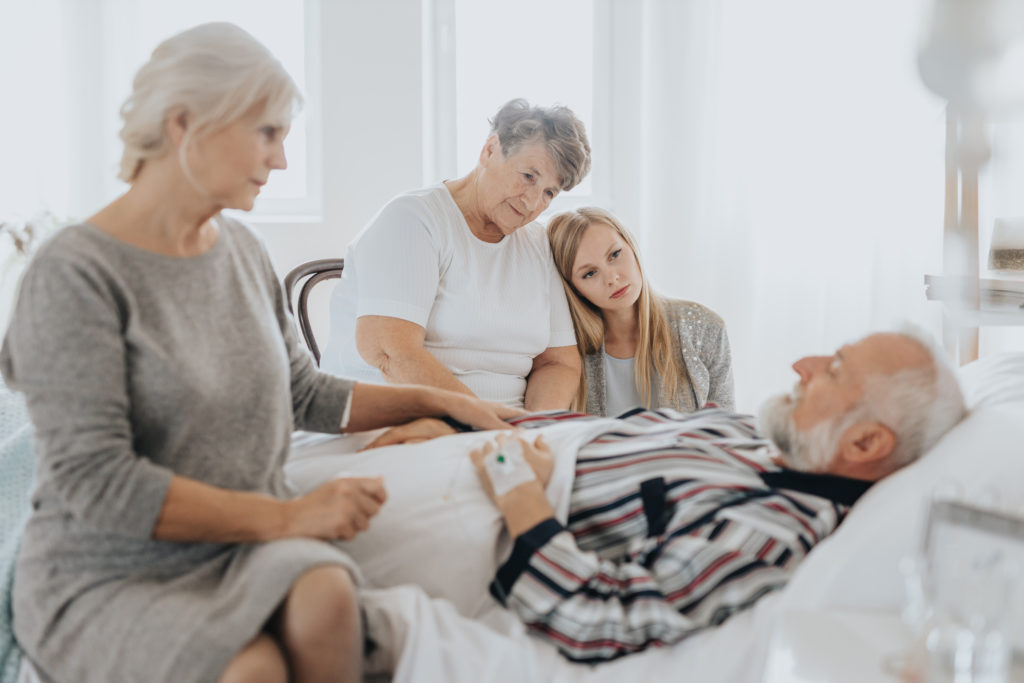
Before she found out the devastating news that she might not have long to live, Allison Henderson of Brookeville gave much of her time as a compassionate volunteer helping others who were facing the end of their own life’s journey.
Henderson served as a board member for the nonprofit CaringMatters in Gaithersburg, which offers nonmedical hospice support, including emotional, social and practical care. There, she helped spread awareness about the importance of end-of-life planning.
Then Henderson was diagnosed with Stage 4 pancreatic cancer, and it would be other volunteers within the CaringMatters Volunteer Helping Hands program, of which she had been an integral part, who would assist Henderson and her family before she died at age 59 on July 1.
“She was really grateful for any time that she had and focused on trying to engage with life even as she felt her body decline,” says Henderson’s daughter Nicole Denier, who is thankful for the kind presence, assistance and grief support CaringMatters gave to her family. “Those who provide care at the end of life are truly amazing and deserve our deepest appreciation.”
“We walk alongside the patient … and support them in whatever way they would like, so that they can live as fully as possible until their last breath,” says Penny Gladhill, director of Volunteer Helping Hands and one of the founders of CaringMatters.
In hospice care, it’s that personal presence that means so much.
According to the Hospice Foundation of America, when patients and their families decide it’s time to choose hospice, it usually means a physician has determined that the patient may have six months or less to live. The purpose of hospice is to ensure the highest quality of life until the end, as pain-free and symptom-free as possible for the patient, and as joy-filled with cherished personal connections.
But Covid presented new challenges for the patient and caregiver at Montgomery County hospices. Physical distancing and stay-at-home orders designed to protect everyone’s health and safety meant more isolation and less personal contact for everyone, especially the most vulnerable populations.
“It has always been being present and showing up—that was the gift we offered,” says Gladhill. “Although the pandemic has altered our services, the power of caring is unchanged.”
“Our staff and volunteers quickly pivoted to shift our services to offer other types of physically distant support—connecting with our clients via phone calls, text, emails and video-conferencing,” says Leigh Bluestein, director of communications and education. “They have also been sending cards and letters to clients and their families to help assure them that they are not alone.”
Bluestein adds that some measures of practical support without face-to-face interaction have now resumed, including grocery shopping and meal pickup, with no contact, safe delivery.
Other forms of caring, on the other hand, will continue to be virtual. “We started a new online support group for caregivers of our clients to allow them to share stories and gain support from each other,” says Bluestein. “Caregivers often can’t leave home to attend an in-person support group, so we plan to continue this support group even after physical distancing guidelines have been lifted.”
“My mom really valued her relationship with her CaringMatters volunteer,” says Denier. “They would visit weekly before Covid and send letters once the pandemic hit. When my mom was recounting positive things that happened following her diagnosis, one big thing was that she was able to form a new friendship even as she approached death.”
Jewish Social Service Agency (JSSA) Hospice is known for providing compassionate, attentive end-of-life care to patients in Montgomery County, along with peace of mind and comfort to families and loved ones. JSSA Hospice’s broad range of services also includes essential medical care such as pain relief and symptom management. For this reason, “we have continued to provide in-person visits whenever and wherever possible” during the pandemic, says JSSA Hospice director Joy Sexton, RN, BSN. “We worked diligently and spared no expense to find sufficient supply of personal protective equipment to keep our staffs and patients as safe as possible.”
She explains that the JSSA hospice team has had to be agile and nimble.
“Perhaps the most difficult aspect of this pandemic for us, from an operational standpoint, is how the landscape of rules and regulations continue to change. In hospices, the most significant impact has occurred in facilities (nursing homes, assisted living facilities and group homes), whose desire, understandably, to keep their residents safe have imposed restrictions on our access to patients,” says Sexton. “We utilized every resource possible to continue our care virtually and via telehealth. These restrictions have impacted family members as well and prevented many families from being able to be with their loved ones in their final days of life.”
Over the last six months, JSSA Hospice also cared for patients with a positive Covid diagnosis, says Sexton. “Our staff saw a shorter length of stay (days between admission to death) for the Covid population, making it more important for the interdisciplinary team to connect with the family quickly and begin the work—often preparing families who do not believe their loved one will die suddenly.”
For the staff that worked with patients and may have felt stress about novel coronavirus, JSSA provided twice weekly support groups along with education regarding the disease. The JSSA hospice team reports feeling well supported during this time.
Sexton notes that with testing now more available, “we are testing all clinical staffs. This includes our social workers, chaplains and hospice aides. This has reassured facility administrators and families that our staffs are safe to provide care to their residents and loved ones respectively, and we are making more in-person visits.”
Debby Tucker of Potomac lost her husband Samuel in December 2019. Although this was before the pandemic, it was still a very challenging time, and she is thankful to JSSA Hospice for the exceptional supportive care. “It becomes care of the family as well as care of the patient. Hospice is family centric. We, the caregivers, need to be cared for as much as the patient.”
Tucker says her husband was suffering from frontotemporal dementia neurodegenerative disease. “I did not want him to die in pain or distress. JSSA Hospice provided him comfort,” she says with gratitude.
Tucker’s son Seth, of Silver Spring, says, “For me, hospice was a chance to have someone who could help us through the various stages of the process. When we started, I went to a caregiver support group for young adults taking care of their parents.” He notes that this support group met virtually rather than in-person, which he preferred. “It can easily become overwhelming,” he says about the emotional challenges of caregiving and losing a loved one.
JSSA Hospice was emotionally and physically supportive, says Debby Tucker. “There’s no way we could’ve done it without all the things they provided.”
This a version of this story originally appeared in the October-November issue of Montgomery Magazine.




